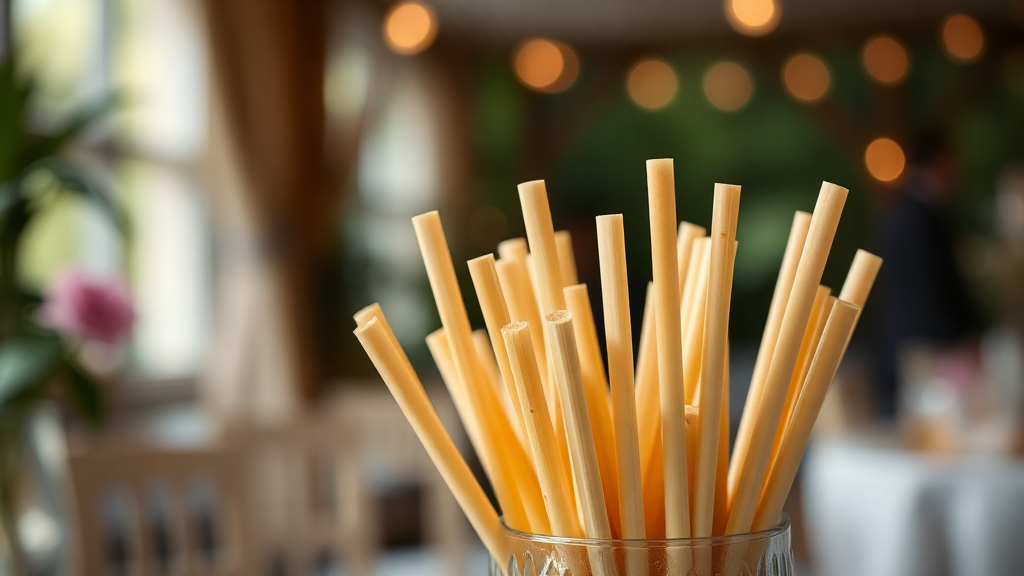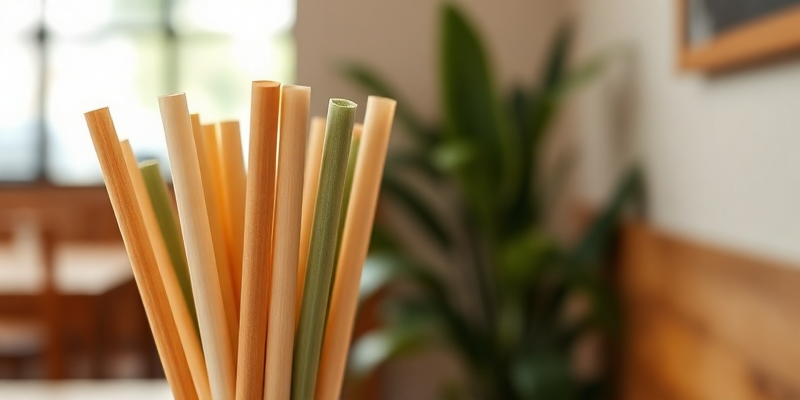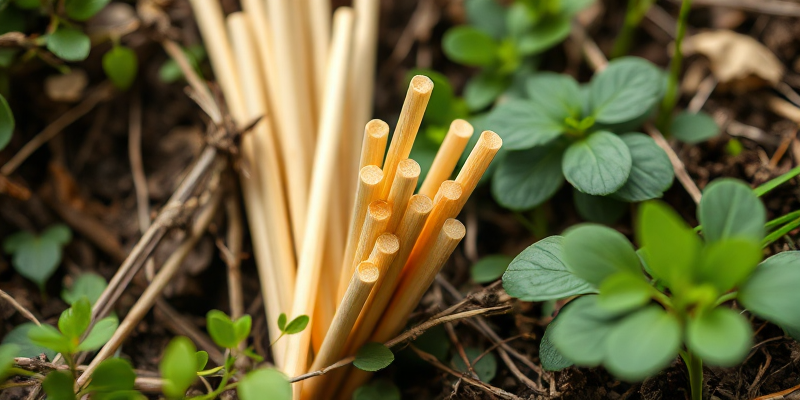FDA-Certified Sugarcane Straws for B2B: Sustainable & متوافق

Introduction: Plastic Bans and FDA-Certified Sugarcane Straws for B2B Benefits

Picture this: It’s Monday morning, and you’ve just received an email notification about your city’s new single-use plastic ban taking effect in 60 days. As a procurement manager for a hotel chain, restaurant group, or beverage company, you’re now facing an urgent challenge. The plastic straws you’ve been ordering for years will soon become non-compliant, potentially resulting in hefty fines and disappointed customers.
This scenario is playing out acros the globe as more than 100 countries have now implemented some form of single-use plastic regulation. From California to the European Union, from Canada to India, the legislative landscape is shifting dramatically toward sustainable alternatives. For businesses operating acros multiple jurisdictions, staying compliant has become increasingly complex.
In this new reality, FDA-certified sugarcane straws have emerged as a leading solution for forward-thinking B2B buyers. Unlike traditional plastic straws that can take centuries to break down, sugarcane straws offer a renewable, biodegradable alternative that meets stringent food safety requirements while delivering a superior customer experience.
The urgency of this transition cannot be overstated. In regions like the European Union, companies found violating single-use plastic regulations can face penalties of up to €50,000 per infraction. Even beyond compliance considerations, consumer preferences are evolving rapidly. A recent global consumer survey revealed that 73% of consumers would switch brands based on environmental considerations, translating directly to your bottom line.
Explore FDA-certified sugarcane straws wholesale options that can help your busines navigate this changing landscape while enhancing your sustainability credentials. The transition doesn’t have to be disruptive – with the right supplier partner, it can become a busines advantage.
Regulatory Compliance: FDA & LFGB Certifications for FDA-Certified Sugarcane Straws for B2B

When it comes to food-contact materials like straws, regulatory compliance isn’t optional – it’s essential. For B2B buyers sourcing acros international markets, understanding the certifications that matter can save tremendous headaches down the road.
FDA certification represents the gold standard for food safety in the United States. When sugarcane straws carry this certification, it means they’ve been rigorously tested to ensure they don’t leach harmful substances into beverages. The FDA’s food contact materials guidelines (rel=”nofollow”) are some of the most comprehensive in the world, evaluating everything from manufacturing processes to materials composition.
Similarly, LFGB certification (Lebensmittel- und Futtermittelgesetzbuch) is the European equivalent, offering stringent testing that often exceeds FDA requirements. For businesses operating in or exporting to the EU, this certification is non-negotiable.
Why does this matter to your busines? Consider this: According to food safety compliance data, businesses using non-certified food contact materials face an average of $120,000 in regulatory penalties per incident, not including the reputational damage and potential litigation costs. One hotel chain in California recently learned this lesson the hard way, incurring $75,000 in fines for continuing to use non-compliant straws after local regulations changed.
Learn more about sustainable LFGB-certified sugarcane straws that meet international safety standards while supporting your sustainability goals. These dual-certified products simplify procurement for multi-national operations, ensuring consistent compliance acros all your locations.
How FDA-Certified Sugarcane Straws for B2B Compares to Other Eco Alternatives

The sustainable straw market has exploded with options, making it challenging to determine which solution best meets your busines needs. Let’s compare FDA-certified sugarcane straws against other popular alternatives:
| بديل | متانة | تجربة العملاء | قابلية السماد | الآثار التكلفة | التدقيق المطلوب |
|---|---|---|---|---|---|
| ————- | ———— - | ———————— | —————- | ———————— | ———————— |
| قش قصب السكر | 2-3 hours in cold/hot liquids | Natural feel, no taste transfer | Home compostable in 90 days | Medium initial cost, decreasing with volume | FDA, LFGB certified |
| القش الورق | 30-60 minutes before softening | غالبًا ما يصبح منديًا ، يمكن أن يؤثر على الذوق | Industrial compostable | Low initial cost, high replacement rate | Varies by manufacturer |
| PLA “Bioplastic” | Excellent, similar to plastic | Identical to plastic | Industrial compostable only (180+ days) | Medium | Often FDA certified, rarely LFGB |
| قش الخيزران | Reusable for months | Unique texture, may affect experience | Not applicable (reusable) | High initial investment, low long-term | Varies significantly |
| Pasta Straws | 30-45 minutes | Affects beverage taste | Home compostable | Medium | Rarely fully certified |
What this comparison doesn’t show is the environmental lifecycle impact. A comprehensive study by the University of Cambridge found that sugarcane straws produce 79% les carbon emissions acros their lifecycle compared to conventional plastic straws, outperforming even paper alternatives (which achieved only a 54% reduction).
For businesses seeking FDA-certified large plastic straws alternatives that maintain the functionality customers expect while delivering on sustainability promises, sugarcane offers the optimal balance. The strength and durability of these straws make them particularly suitable for thick beverages like smoothies and bubble tea – applications where other eco-alternatives often fall short.
Top Busines Benefits of Switching to FDA-Certified Sugarcane Straws for B2B
The busines case for transitioning to sugarcane straws extends far beyond mere regulatory compliance. Forward-thinking companies are discovering multiple advantages that positively impact their bottom line.
First, there’s the marketing value. Sustainable brand initiatives that include visible elements like sugarcane straws create authentic storytelling opportunities. Unlike behind-the-scenes sustainability efforts, straws put your commitment literally in customers’ hands. One quick-service restaurant chain reported a 22% increase in positive social media mentions after switching to sugarcane straws, with customers specifically highlighting the eco-friendly touch point in their posts.
Second, the pricing landscape is shifting. While sustainable alternatives once commanded significant premiums, increased production scale has dramatically narrowed the gap. When ordered in appropriate B2B volumes, the cost difference between sugarcane and conventional plastic straws has decreased to approximately 1.2-1.5¢ per unit – a difference easily absorbed or offset through slight menu adjustments or sustainability surcharges that customers increasingly accept.
Third, customization options create branding opportunities. Custom FDA-certified sugarcane straws can feature your logo, messaging, or QR codes, transforming a necessary item into a marketing asset. This level of personalization was previously prohibitively expensive with sustainable alternatives but has become increasingly accessible.
Finally, employee satisfaction and retention show measurable improvement when companies commit to sustainability initiatives. According to Deloitte’s sustainability workforce survey, 49% of Gen Z and Millennial employees – the largest growing segment of the workforce – have made career choices based on an employer’s environmental values.
Environmental Impact: Why FDA-Certified Sugarcane Straws for B2B Wins
The environmental credentials of sugarcane straws go beyond simply being “not plastic.” The agricultural proces creates a closed-loop system with remarkable sustainability benefits.
Sugarcane is one of the world’s most efficient carbon-capturing crops. During growth, it actively sequesters carbon dioxide, with each hectare absorbing approximately 40 tons of CO2 annually. What makes sugarcane particularly sustainable is that the straws are produced from bagasse – the fibrous byproduct left after juice extraction for sugar production. This means the straws utilize material that would otherwise be waste, creating value from what was previously discarded.
The United Nations Environment Programme has highlighted agricultural waste repurposing as a key strategy in transitioning to circular economies. In their comprehensive report on plastic alternatives (rel=”nofollow”), bagasse products like sugarcane straws received high marks for their low environmental impact and end-of-life attributes.
Perhaps most importantly for foodservice businesses, sugarcane straws are home compostable within 90 days under proper conditions, breaking down completely without leaving microplastics behind. This makes them compatible with bulk eco-friendly solutions for restaurants seeking to minimize their environmental footprint throughout their operations.
Case Study: FDA-Certified Sugarcane Straws for B2B Succes in Action
Ocean Breeze Resort Group, a mid-sized hospitality company with 12 properties acros coastal regions, provides a compelling example of successful transition to sugarcane straws.
The challenge began when three of their properties faced impending plastic straw bans in 2022. Rather than implementing different solutions for different locations, management decided to standardize sustainable straws acros all properties. Their key requirements included durability in tropical cocktails, compliance with diverse regulations, and alignment with their ocean conservation branding.
After testing multiple alternatives, they selected FDA-certified individually wrapped straws made from sugarcane for hygiene and compliance reasons. The implementation involved:
1. A phased rollout starting with beachside properties
2. Staff training on sustainability messaging
3. Integration into their existing ocean conservation program
4. Custom branding with their sea turtle conservation logo
The results proved the busines case. Within six months, Ocean Breeze documented:
- 62% reduction in plastic waste by weight
- 18% increase in positive guest satisfaction comments mentioning sustainability
- $37,000 savings in anticipated non-compliance penalties
- Featured case in a travel magazine’s sustainable tourism edition, generating free publicity
The succes prompted them to expand their sustainability program to other single-use items, using the straw program as their template and proof of concept.
أسئلة مكررة
- What makes sugarcane straws FDA-certified, and why does it matter?
- FDA certification means the straws have been thoroughly tested to ensure they’re safe for food contact applications. The certification verifies that no harmful chemicals leach into beverages and that the manufacturing proces meets stringent hygiene standards. For B2B buyers, this certification eliminates compliance concerns and provides documented safety assurance for your customers.
- How do sugarcane straws perform in different beverages?
- Sugarcane straws maintain structural integrity for 2-3 hours in most cold beverages and 45-60 minutes in hot drinks below 190°F. They perform exceptionally well in smoothies, bubble tea, and cocktails where other eco-alternatives often fail. Unlike paper straws, they don’t become soggy or affect beverage taste.
- What minimum order quantities (MOQs) should we expect for B2B purchases?
- Standard B2B order minimums typically start at 10,000 units for stock items, while custom-printed or specialized sizes may require 25,000-50,000 units. Volume discounts usually begin at 100,000 units, with significant price advantages at 250,000+. Flexible options are available for businesses testing the product before full implementation.
- Can sugarcane straws be customized with our logo or in custom sizes?
- Absolutely! FDA-certified compostable straws for businesses can be customized with your logo, brand colors, or messaging using food-safe inks. Custom diameters (5-12mm) and lengths (150-250mm) are available for specialized applications like bubble tea or cocktails. Custom orders typically add 2-3 weeks to delivery timeframes.
- How should we dispose of sugarcane straws properly?
- Sugarcane straws can be disposed of in industrial composting facilities, home compost systems, or regular waste streams. They’ll completely break down in home composting conditions within 90 days. If composting isn’t available, they’ll still biodegrade faster than conventional alternatives in landfill environments, though the proces takes longer.
- What’s the shelf life of sugarcane straws?
- When stored in their original packaging in a cool, dry environment, sugarcane straws maintain quality for 24-36 months. Once the package is opened, we recommend using them within 12 months for optimal performance. Unlike some bioplastics that can degrade prematurely in humid conditions, sugarcane straws remain stable until composted.
- How do your straws comply with international regulations for export markets?
- Our sugarcane straws carry both FDA certification for North American markets and LFGB certification for European Union compliance. This dual certification ensures seamles use acros global operations. We also provide documentation for Australian, Japanese, and Canadian regulatory frameworks, simplifying international procurement.







